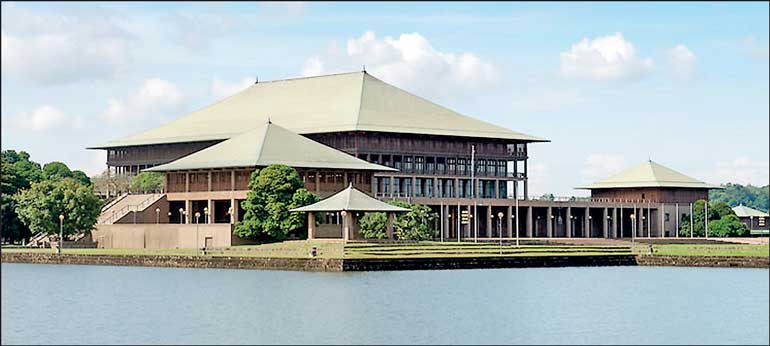Saturday Feb 14, 2026
Saturday Feb 14, 2026
Wednesday, 18 May 2022 00:20 - - {{hitsCtrl.values.hits}}

In 2015 Civil Society taking the lead, pushed enactment of the 19A. With the election of MS as President and RW as Prime Minister the version of the 19A that was enacted was a watered-down version due to political horse trading and politicians’ attempts to leave out certain provisions with view to leveraging future political situations.
version due to political horse trading and politicians’ attempts to leave out certain provisions with view to leveraging future political situations.
Thanks to the peoples’ “GotaGoHome” struggle, the 21A to repeal the 20A and bring back into effect the provisions of the 19A is a hot topic of discussion to transition out of the prevailing crisis ridden political situation. The SJB has tabled its version of the 21A. Whilst the SJB version does address the repeal of 20A and does bring back provisions of the 19A, yet 21A lacks sufficient teeth to rein in Elected Representatives.
The systemic failure of our governance structure which resulted in the current catastrophic crisis situation was not only due to undue power vested with politicians elected to office but also, bureaucrats and professional moles who were positioned in important places of power by those politicians with vested interest, who equally contributed to the systemic failure. Every effort should be made by the people to ensure this window to appoint bureaucratic and professional moles to positions of power and high posts is closed and the authority to appoint passed on to a competent authority, to appoint based on credentials of the candidate being appointed.
The areas I believe that need addressing are listed herein:
1.Cabinet Ministries/Ministers
1.1 Proposed in 21A
Up to a maximum of 25 Ministries to be designated by the President on the advice of the Prime Minister.
Proposed revision
25 Ministries to be designated and enshrined in the Constitution with no provision for addition and or reduction, unless by an amendment to the Constitution. The Prime Minister only to advise the President on the appointment of Cabinet Ministers
Reason
We have witnessed the Presidents, who has had the power to designate Ministries, designating Ministries willy-nilly without any rational reasoning! Passing this Presidential authority to the Prime Minister will lead to similar willy-nilly designation.
2.Cabinet subjects and functions
2.1 Proposed in 21A
Prime Minister to advise President the assignment subjects and function of Ministries to the President.
Proposed revision
Assignment of subjects and functions to Ministries should be the function of the Independent Public Service Commission, which is proposed to be set up under the 21A. All additions and or deletions to be within the purview of the Public Service Commission. The Public Service Commission will be the most competent authority to perform this function
Reason
We were all witness to the allocation of Ministry subjects and functions in a scientific manner!
3.Non-Cabinet Ministers
3.1 Proposed in 21A
Prime Minister has the authority to advise the President on the number of Non-Cabinet Ministers.
Proposed Revision
Appointment of Non-Cabinet Ministers provision should be deleted.
Reason
Non-Cabinet Ministers have been used as the tool for horse trading and as gratification for support to the ruling party.
4.Deputy Ministers
4.1 Proposed in 21A
Prime Minister has the authority to advise the President on the number of Non-Cabinet Ministers (Capped by Maximum at 25 Non-Cabinet/Deputy Ministers)
Proposed revision
25 Deputy Ministers to the 25 designated Ministries no provision for addition and or reduction, unless by an amendment to the Constitution. The Prime Minister to advise the President on the appointment of Deputy Ministers
5.President’s staff
5.1 Proposed in 21A
Secretaries to be appointed by the President and the no of secretaries and staff to be decided by the Cabinet of Ministers.
Proposed revision
a) Secretary to be appointed by the Constitutional Council on the recommendation of the Public Service Commission. Secretary to the President to be included in Schedule Chapter VIIA, Article 41C Part II.
b) No. of Secretaries and the no. of Presidential Staff to be decided by the Public Service Commission as it the most competent authority.
Reason
The purpose of incorporating an Independent Public Service Commission is to make Public Service independent of politicians.
In this backdrop, the President’s Secretary too performs an important public service and should be appointed independently, preventing bureaucratic moles of politicians being appointed to this important position.
6.Secretary to the Cabinet
6.1 Proposed in 21A
To be appointed by President on the advice of the Prime Minister
Proposed revision
To be appointed by the Constitutional Council on the recommendation of the Public Service Commission. Secretary to Cabinet to be included in Schedule Chapter VIIA, Article 41C Part II.
Reason
The purpose of incorporating an Independent Public Service Commission is to make Public Service independent of politicians. In this backdrop, the Cabinet Secretary too performs an important public service and should be appointed independently, preventing bureaucratic moles of politicians being appointed to this important position.
7.Secretary to the Prime Minister
7.1 Proposed in 21A
To be appointed by President on the advice of the Prime Minister
Proposed revision
To be appointed by the Constitutional Council on the recommendation of the Public Service Commission. Secretary to Prime Minister to be included in Schedule Chapter VIIA, Article 41C Part II.
Reason
The purpose of incorporating an Independent Public Service Commission is to make Public Service independent of politicians. In this backdrop, the Prime Minister’s Secretary too performs an important public service and should be appointed independently, preventing bureaucratic moles of politicians being appointed to this important position.
8.Secretary to Ministries
8.1 Proposed in 21A
To be appointed by President on the advice of the Prime minister
Proposed revision
To be appointed by the Constitutional Council on the recommendation of the Public Service Commission. Secretary to Ministries designated in the Constitution be included in Schedule Chapter VIIA, Article 41C Part II.
Reason
The purpose of incorporating an Independent Public Service Commission is to make Public Service independent of politicians. In this backdrop, all Ministry Secretaries too perform an important public service and should be appointed independently, preventing bureaucratic moles of politicians being appointed to these important positions.
9.Appointment of President’s Counsels
9.1 Proposed in 21A
To be appointed by President Attorney-at-laws who have reached eminence in the profession and have maintained high standards of conduct and professional rectitude.
Proposed revision
BASL should have a role in recommending to the President those who qualify to be appointed in the opinion of BASL.
Reason
Presidents have been appointing friends and family and those nominated by friends and family from the legal profession as President’s Counsel and have diluted the stature of this esteemed title.
10.Appointment, promotion, transfer, disciplinary control, and dismissal of all Heads of Department
10.1 Existing provision
The appointment, promotion, transfer, disciplinary control, and dismissal of all Heads of Department shall, vest in the Cabinet of Ministers.
Proposed revision
The appointment, promotion, transfer, disciplinary control, and dismissal of all Heads of Department should vest with the Public Service Commission.
Reason
This is a tool used by politicians for horse trading, gratification, and positioning moles to execute agendas based on vested interest.
11.Appointment, promotion, transfer, disciplinary control, and dismissal of high commissioners and senior foreign service personnel proposed revision
The appointment, promotion, transfer, disciplinary control, and dismissal of all High Commissioners should vest with the Public Service Commission. Appointment of High Commissioners could be by the President on the recommendation and advice of the Constitutional Council.
Appointment of senior foreign service personnel below rank of High Commissioner by the Public Service Commission.
Reason
This is also a tool used by politicians for horse trading, gratification, and positioning moles to execute agendas based on vested interest.
In winding up, what’s important is, sovereignty rests with the people, and the elected representatives are only proxies of the people representing the people’s interest in parliament. Unfortunately, this principle has been alien to elected representatives and time and again elected representatives have abused this solemn responsibility to the people to satisfy their own or their master’s agenda/s. In this backdrop reigning in elected representatives, through checks and balances in the constitution is paramount and the current situation is an ideal opportunity to ensure the required checks and balances are enshrined in the constitution.
The composition of the Constitutional Council as proposed in the 21A is a big step forward as it will consist of a majority (5 out of 9) of members (independent) of eminence and integrity who have distinguished themselves in public or professional life and who are not members of any political party. Likewise, the Public Commission too will be an eminent body elected by the independent Constitutional Council.
In this backdrop prudence dictates enshrining the authority to appoint important public officials be given to these two esteemed independent bodies instead of an elected representative and thereby giving the elected representative unfretted power and authority to control the functions of the cabinet and the government, and thereby potentially abuse the authority to the detriment of the people.
This time around, the people, whose trust has been abused time and again by elected representatives should stand firm and ensure these proposed revisions are included in the 21A, to ensure a transparent and accountable governance structure is put in place through this amendment to the Constitution.
Long live Sri Lanka!
Long live the people of Sri Lanka!
United We Stand Divided We Fall!
(The writer is an Independent Investment Banking Advisor and could be reached via email at [email protected].)